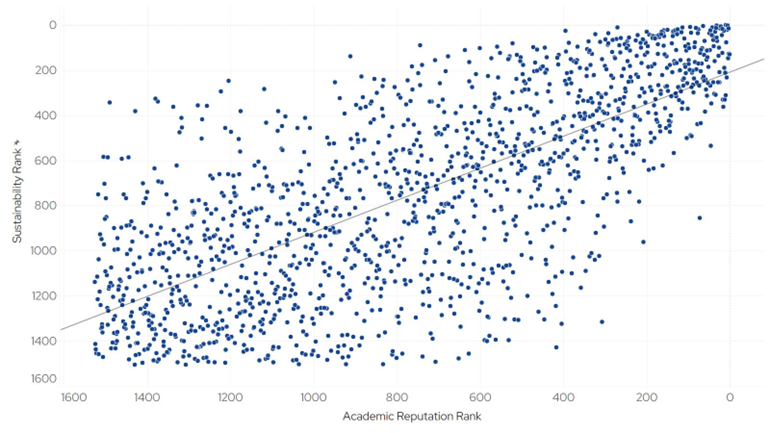
This article is written by Leigh Kamolins, Director of Analytics & Evaluation at QS. It was originally published in HEPI – read their version here.
Increasingly driven by environmental and social consciousness, students are aligning their values for a greener, fairer future with their educational decision-making. Data collated for the QS World University Rankings 2025 reveals that there is a positive connection between a university’s sustainability outputs and their academic reputation, as universities with strong scores in the Academic Reputation metric tend to perform well in the Sustainability metric (with a correlation score of 0.72.)

There is a powerful opportunity for high-ranking universities to leverage their reputation to elevate their sustainability performance and differentiate themselves from competitors. For lower-ranking universities, investment in sustainability initiatives could be the key to building a stronger global reputation, overall.
I was invited to participate in the UN Higher Education Sustainability Initiative Forum as part of the High Level Political Forum on Sustainable Development, in July. One of the most shocking outcomes discussed was the alarmingly low progress towards achievement of the UN’s SDGs with only 17 percent on track, and many in decline. Higher education plays a unique role in helping to turn this picture around.
Almost two-thirds of prospective students interested in studying in the UK say that sustainability is very or extremely important to their decision-making, and students see on-campus initiatives and work with the local community on sustainable and social justice initiatives as the most important activities universities can do (QS International Student Survey 2024).
As universities give more focus to the delivery and promotion of environmental and social sustainability outputs – differentiation will be crucial to stand out in a crowded market of generalised sustainability messaging.
Where excellence in reputation and sustainability meet
The UK’s University of Manchester is a strong example of where excellence in reputation and sustainability meet. The University is the world’s third most sustainable university and number one in Europe. It also ranks in the world’s top three percent for Academic Reputation (QS World University Rankings 2025).
The University of Manchester’s Living Lab supports students and staff to affect change by working with external organisations to meet the UN’s SDGs. The university also launched a recent partnership with a renewable energy company to develop a solar farm which will meet 65 percent of the university’s energy.
Julia Durkan, Head of Environmental Sustainability at the University of Manchester, spoke to QS about how academic reputation and sustainability go hand in hand at the university. She said: “We’ve integrated sustainability within the core goals of the university, so social responsibility sits alongside teaching and learning, and research and innovation. It’s embedded at the heart of what we do. We’re all on our own journey and we have to discover where our strengths lie and work around that to improve performance, collaborating with other institutions where we can have greater impact.”
There is no one-size-fits-all approach to building reputation or delivering impactful sustainability outputs. Utilising data and analytics to understand where your uniqueness lies can enable you to identify the areas where you can have the greatest impact, and collaborate with other institutions, companies and organisations to further amplify that impact.
How to leverage the connection between reputation and sustainability
Recognising the symbiotic relationship between a strong reputation and sustainability efforts allows universities to not only enhance their prestige but contribute meaningfully to global environmental and social sustainability goals. This strategic alignment can drive impactful outcomes in both institutional growth and societal benefit.
Understand your benchmark
Understanding your performance in academic reputation and sustainability is a vital first step to benchmark against competitors and create an effective strategy to drive recruitment. Pinpoint areas for collaboration to amplify your impact and identify partners to support learning in the areas you aren’t performing as well in.
Listen to student perspectives and motivations
What matters to students continues to evolve. Keeping your pulse on the perspectives and motivations of students will enable institutions to reflect their values through authentic and aligned communications and services.
Leverage your reputation to promote sustainability initiatives
For universities with a highly credible global reputation, leveraging existing research links and expanding the portfolio to include sustainability can drive innovation and knowledge transfer for sustainable results, while enhancing your reputation, in turn.
Drive engagement with impactful storytelling
Universities have become well-practiced in creating impactful storytelling to showcase institutional reputation. Using these skills to develop unique narratives that centre sustainable values would be impactful when attracting both students and industry partners to your institution.
Collaborate to amplify your impact
Build partnerships to share knowledge – the heart of SDG 17 ‘Partnerships for the goals’ – and engage in networks and forums, such as the International Universities Climate Alliance, as part of your strategic approach, to share best practices and to support the broader ecosystem in progressing the goals.
See the bigger picture of sustainability
More than half of the UN’s SDG goals are aimed at addressing social challenges. To truly embody the principles of sustainability, universities must amplify a positive impact on social sustainability as well as environmental efforts, all underpinned by good governance.
Strategically intertwining sustainability initiatives with efforts to bolster academic reputation can help universities to achieve greater prestige and make significant strides to becoming leaders in socially responsible education.